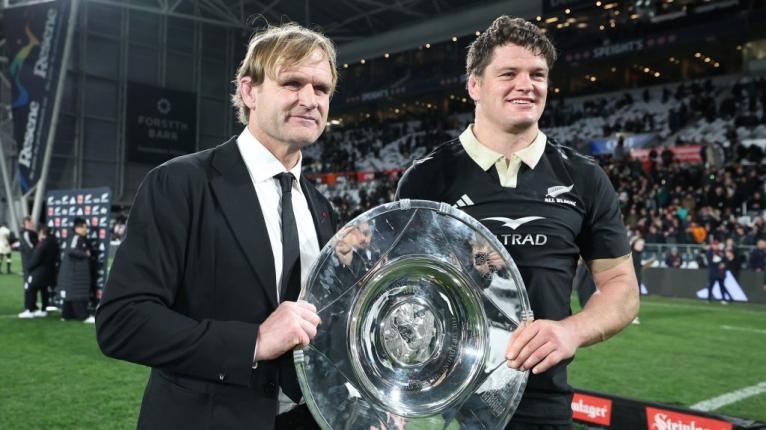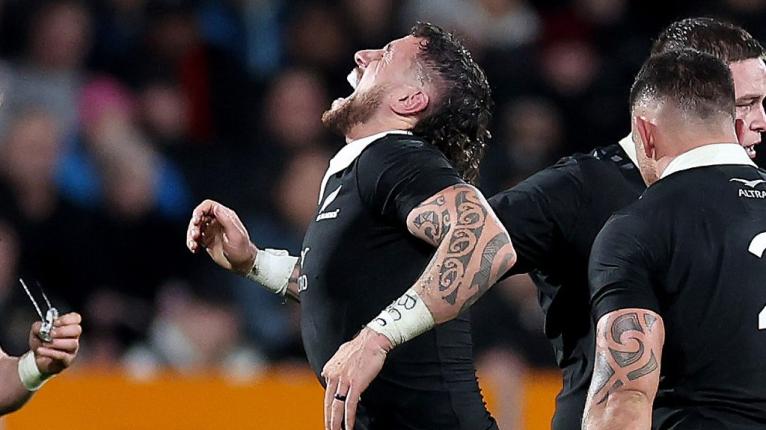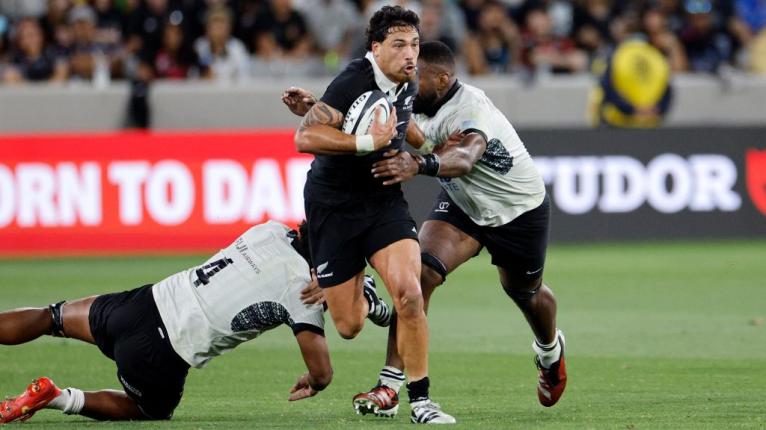It’s possible everyone in New Zealand is continuing to ask a question to which they already have the answer. Three games into his All Blacks tenure as head coach and the nation feels it still doesn’t know what style of rugby Scott Robertson wants his team to employ.
The All Blacks have beaten England twice and Fiji, and in doing so provided evidence they have a formidable scrum, game-breaking talent in Beauden Barrett and Ardie Savea, and a promising generation of youngsters coming through. According to sections of the Kiwi public and media, this has been achieved without establishing a clear sense of stylistic identity.

But everyone may have missed the point. Robertson is not going to build an All Blacks team wedded to one particular style of playing, but instead, his vision is to develop enough strategic flexibility in the system to adapt to any opponent and any conditions.
He’s said as much already – in a season in which the All Blacks will play 14 Tests in nine different countries and an inevitable variety of weather conditions, his team will need to be prepared to change things up tactically week to week.
He hasn’t been explicit about this bit, but historically this inability to adapt to the sort of defensive and set-piece pressure teams such as South Africa, Ireland, England and France have been able to exert, has been the All Blacks’ achilles heel.
The perpetual failing of the All Blacks has been their inability to adapt their approach when plan A hasn’t worked, and if Robertson has one overriding goal, it is to become the coach who set up his team with workable alternative game plans.
Under previous coaching regimes, the All Blacks have perhaps been too wedded to playing up-tempo, ball-in-hand rugby where the attack game is all about generating width.
When it comes off it is deadly, but too often in the last decade, the All Blacks were susceptible to being stifled by the rush defence systems favoured by their main rivals and the pressure these teams could exert through relatively low-risk, kick-based rugby.
The perpetual failing of the All Blacks has been their inability to adapt their approach when plan A hasn’t worked, and if Robertson has one overriding goal, it is to become the coach who set up his team with workable alternative game plans.
Already, we have seen how the strategy adopted in the Auckland winter against England, evolved when the team flew to play Fiji in the Californian sun seven days later.
Three wins in three games against two vastly different opponents would say that Robertson is on track towards building the flexibility he wants, but the Rugby Championship will ask a whole new series of questions about the All Blacks and the tests against England and Fiji highlighted the need for a few personnel changes to be made if the victories are to keep coming.
Robertson may only just have his feet under the desk, but his first three Tests have delivered strong evidence he needs to be bold enough to make a few major selection calls and ease big names out or into different roles.
Coming into the series against England, it was apparent Robertson was worried about his lack of experience at half-back, hence the decision to start veteran TJ Perenara and put Finlay Christie, the next most experienced number nine, on the bench.

But the picture has changed dramatically since that first selection was made and the previously uncapped Cortez Ratima has reshaped the pecking order after playing superbly in two short bursts – off the bench at Eden Park and then as a starter against Fiji.
If the main priority is to build different tactical elements to the gameplan, then Ratima is the man in whom Robertson needs to trust and promote.
What Ratima brings that neither Perenara nor Christie do, is an ability to play a high-tempo game. When he came on against England, his speed to the breakdown, clarity of thinking once he got there and precise execution changed the game.
England’s defence lost some of its sting because the All Blacks were moving the point of attack too quickly and there is a sense Perenara and Christie both like to deliberate with their decision-making which shuts off the number of available options as a result.
The other advantage to starting Ratima is it pairs him with his Chiefs 10 Damian McKenzie, who has established he is going to be Robertson’s preferred playmaker.
He’s owned the 10 jersey, and owned the team. He asked and demanded more of others.
McKenzie became more comfortable in the jersey the more he played in it, and while his strategic kicking is a definite work-on, Robertson made it clear he was happy with what he saw.
“He’s owned the 10 jersey, and owned the team,” said the coach. “He asked and demanded more of others.
“Obviously there’s parts of the game where he can grow – as we all can. But he’s started to own that jersey, and that’s what we’ve asked of him.”
A commitment to playing McKenzie at 10 means there has to be a similar commitment to starting with Beauden Barrett at full-back to shore up the tactical kicking options, give a stronger decision-making presence in the backfield and provide the team with a second play-maker.
Again, if the quest is for flexibility, picking Barrett at full-back is the way to get it as he showed defences can be broken by intelligent kicking, well-angled intrusions into the attack line and astute timing of the pass.
There will be a media and public campaign to bring in the returning Will Jordan in the number 15 jersey, but his limited kicking game and inexperience operating as a first receiver, immediately cuts down the variety of ways in which the All Blacks can play.
If they put him on the wing, however, it’s another big win for variety as Jordan showed last year he can be a useful retriever of contestable kicks and, most significantly, he’s the master at coming off his flank in unexpected places and catching defences cold.
But the biggest change Robertson is going to have to consider is whether to install Billy Proctor as his first-choice centre ahead of Rieko Ioane. Proctor made a high-impact debut in San Diego where he showed the full array of his skillset – particularly his ability to pass under pressure and exploit space.

He gave the All Blacks attack the width it didn’t have against England, which may be partly because Fiji didn’t operate the same effective rush defence and Proctor had more time to play than Ioane ever did in the first two Tests.
But Ioane has never been a renowned distributor and against England he twice failed to pass when there were chances to exploit. He plays in the midfield with his head down and a default desire to beat players himself.
Sometimes his strength and pace get the job done, but seeing Proctor play with his head up, his hands out and his brain switched on to assess the options, provided a real sense the All Blacks attack may have been limited against England because Ioane’s own toolkit is limited.
Ioane needn’t be cast to the wind if he’s ousted from his preferred centre role as he remains a viable option to start on the wing, and again, using him in either the number 14 or 11 jersey is another ingredient to add to the strategic melting point.
Ioane is a different wing in style to Jordan, Mark Tele’a, Sevu Reece and Caleb Clarke, and his experience playing at centre opens various possibilities in how he can be used in strike moves and phase play. His height and size also give the All Blacks the sort of defensive presence they need to make them less vulnerable to cross-kicks having conceded three tries so far this year to that particular tactic.
It would be a big call by Robertson to shift Ioane, who set out to establish himself as the All Blacks first choice centre after the 2019 World Cup and managed to do so by the end of 2021, but it feels like be the right call.


The fact that Beauden Barrett, at 33 was a “generation ahead of anyone on Eden Park” is a bit scarry looking at the future of the All Blacks.
There was no ability to “Read the game” until he came on.
I look at Hansen’s 2015 All Black Squad. What a team, what a Coaching Team and a completely dominating result in the World Cup.
Are we as dominant now, probably not.
Razor is a great coach. Hansen surrounded himself by “greater rugby coaches than him” and that is the “Secret to Success” as an All Black Coach.
A company’s success is only measured on the balance sheet.
Hansen’s Balance Sheet was 87% S/R over 93 games as All Black coach.
Hansen was a CEO and the company was the called the ALL BLACKS.
He knows the NZRFU is a “commercial disaster”
Unless we get the business model right, the future of the Professional Games is doomed.
So Sir Steve, come up with a plan. Silver Lake will gradually increase it’s share in New Zealand Rugby and it will be “Lost to New Zealanders forever”
Take the punt and I am sure the money will follow you, with dozens of Wealthy Kiwi Businessmen wanting to be a part of a “New Entity”
Yes, some of us might be getting ahead of ourselves regarding Proctor, but it was good to see a centre who actually looks at options and distributes the ball. Ioane has had a long time in his role and he has never looked like a distributor apart from the odd off load.
Barrett saved N.Z from a drawn series. At 17 -13 we weren’t looking that flash when he came on the field. Itohje had destroyed our lineout. The poms were dominating the kicking game.
Then the best unexpected cameo of “ a player saving a Test” I have ever witnessed.
He mentally lifted the entire team.
In 2016 and 2017 he was the best player in the world. Farrell and Itoje were on that short list.
29 minutes of “Pure Rugby Genius” He did it so easily, without a care in the world.
”That’s simply my job”
Beauden Barrett was a ”generation ahead of anyone on Eden Park on Saturday 13 2024”
Yeah and he had massive help from Ratima and Vaii too. When they all came on the game changed. But its hardly the first time in history NZ has won after trailing at the 50 min mark so perhaps your “Generational” comments are a tad exagerated there.
Barrett will be 37 at the next RWC
Time for new blood, even though the shoes are extra large. Barrett is a genius
Only 36!😂
Jordan will be 15, proctor will be 13,and I can see barrett back at 10 .
I’m afraid Jordan will be 15 soon yes despite the fact he can’t kick well and off both feet and clearly can’t tackle well one on one
Beauden will absolutely not be 10 unless injury
Proctor has a chance yes
Delusional
I would love to see that starting lineup.
The All Black have the “ability” to improve their game by 20%. That will beat all top tier teams in the “World” on any given day.
We have the players. I am confident that the best ‘Head Coach” in the world at the moment will “work out the best combinations” to play any opponent he faces.
RAZORS overall S/R is 83%. His International S/R is 100%.
How do we beat ARGENTINA ranked 7th in the World?
Fred Allen, “Possession, Position, Pace”
Simple, our forwards must dominate Possession.
1. Scrum - We have the scrum.
2. Lineout - Shocking against England, yet we still WON. Great against Fiji except Fiji didn’t turn up.
3. Breakdown. England won that battle, in my opinion.
Backs:
“Our backline is full of stars. Razor will turn them into a “galaxy”
For the series the All Blacks won 181 rucks compared to Englands 151 rucks.
The All Blacks won 101 rucks under 3s and England won 76 rucks under 3s.
We won more rucks and our ruck ball was faster.
On what basis do you think England won the breakdown?
On what basis do you use inverted commas? They are normally used to indicate the text is a quote, or to imply doubt, ambiguity, or contempt. They can also indicate that the writer is misusing a word or phrase, or that they are unpersuaded by the text in quotes.
I have never been able to work out your logic though. Why do you put “ability” or “World” in inverted commas?
I don’t think it was this at all. It was a general scope he was putting over all the playerbase, he went with this cohesion factor in every position.
This also I think is antagonist towards the reference game plans. The other plans do not need the speed of which Perenara (atleast) can’t provide, and I think personal is going to be the main point of difference between these games/opponents. That is the aspect of which I think most people will struggle to grasp, a horses for course selection policy over the typical ‘Top All Black 15’. That best 15 group of players is going to have to get broken down into categories.
So it test one we saw Christie control the game to nullify the English threats out of existence and grind to a win. In test two we saw Ratima need to come on which dictated that this time they would run them off their feet with speed and the space did open up and the victory did come. Horses for courses.
The same concepts are going to exist for every group, front row, lock and loose forward balance, midfield, and outside backs all can have positional changes that the players may be asked to accentualize on and develop. There might be some that it will not ever click for, but they’ll hopefully still be getting to enjoy unbelievable comeback victories and late game shutouts to close it down. Knowing does not mean not enjoying.
I'd say that Christie nullified our threats more than England's! He admitted that his play caused problems for his teammates and his contestables weren't contestable enough, giving the dangerous England back three easy possession.
I agree that we were effective before TJ got injured though.